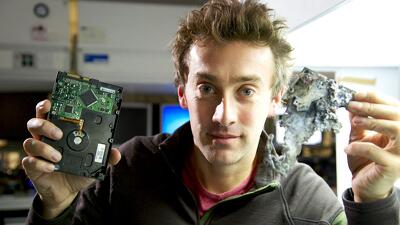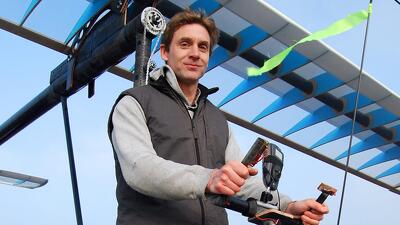Bang Goes The Theory
Season 6
s06e01 / Fuel for Free
12th Mar '12 - 7:30pm
The series takes a look at the price of petrol, and whether science could be used to make fuel for free. Liz experiences life on an oil rig. Jem and Dallas take part in a DIY fuel challenge.
s06e02 / Is Life Too Loud?
19th Mar '12 - 7:30pm
The team attempt to find out if modern life is damaging our ears. Dallas finds out how safety-conscious scientists are putting the noise back into driving. Liz ends up learning to like the sound of being sick. Jem sets out to record the sound of a centipede's footsteps.
s06e03 / Cyber Security
26th Mar '12 - 7:30pm
Liz takes a look at the security of storage devices such as DVDs and memory sticks. Dallas and Jem learn how to completely wipe a computer's memory. Maggie Philbin looks at the different ways in which hackers can try and access smartphones.
s06e04 / Crowds
2nd Apr '12 - 7:30pm
Dallas learns how people in crowds can cooperate subconsciously. Liz learns how architects can control the flow of crowds. Jem talks to some scientists who are attempting to understand how crush injuries can occur. Johnny Ball shows how biologists measure population size.
s06e05 / Wireless Signals
16th Apr '12 - 7:30pm
The teamlook at the health implications of wireless signals with the assistance of Howard Stableford. Jem looks at the possibility of electricity without wires and Liz finds out how mobile phones could help protect people from injury.
s06e06 / Energy
23rd Apr '12 - 7:30pm
Jem attempts to find out whether it would be possible to pedal a homemade plane into the air. Liz looks at how hormones and blood sugar affect energy levels and mood. Dallas discovers whether it is necessary to drink eight glasses of water a day.
s06e07 / Travel Nightmares
30th Apr '12 - 7:30pm
The team take a look at the country\'s travel nightmares this week finding out whether lane-switching works and the best ways to beat travel sickness. Jem is in his workshop to create a man-powered aeroplane in an effort to beat traffic jams.
s06e08 / Humans and Dogs
14th May '12 - 7:30pm
The team attempt to find out what is behind our special relationship with dogs this week. In Austria, Liz and some researchers compare dogs to wolves to see how domestication has shaped canine wits. Philippa Forrester attempts to find out if dogs really can be good for your health with the help of her own dog.